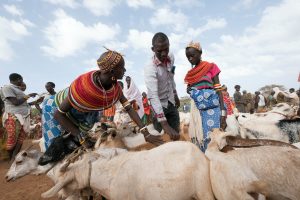 Our partner, the University of California, Davis, will lead a new global research program to build and test ways to overcome some of the biggest remaining challenges for lifting and keeping rural families out of poverty in developing countries.
Our partner, the University of California, Davis, will lead a new global research program to build and test ways to overcome some of the biggest remaining challenges for lifting and keeping rural families out of poverty in developing countries.
The Feed the Future Innovation Lab for Markets, Risk and Resilience, established with a five-year USAID grant of up to $30 million, will study the root causes of poverty and food insecurity with an emphasis on risk from disasters like drought, flood or conflict. The research will help U.S. investments in development to have a lasting impact despite these recurring risks. The new MRR Innovation Lab will build on the research partnership that is pairing a BOMA Project graduation program in northern Kenya with the International Livestock Research Institute’s Index Based Livestock Insurance (IBLI) to help women keep their gains in spite of losses from drought. The project will:
- Measure the impact of REAP and IBLI separately on the extent and depth of poverty at the community level, over time.
- Compare those impacts to the impacts of a package that combines both REAP and IBLI.
- Identify optimal implementation designs for meeting the program’s mission cost-effectively
“As global development efforts continue to improve, we still see humanitarian disasters that strip rural families and communities of hard-won gains,” said Michael Carter, director of the MRR Innovation Lab and professor of agricultural and resource economics at UC Davis. “We will provide needed evidence on how to accelerate those gains and to ensure they stick.”
Research from emerging economies has shown that disasters like drought, flood or war are leading drivers of poverty. The risk of these disasters also keeps families poor by discouraging them from investing in profitable crops or businesses. These challenges are incredibly difficult to overcome.
“The MRR Innovation Lab will test new and promising ways to take agricultural and financial innovations from the lab to the field,” said Tara Chiu, associate director of the MRR Innovation Lab. “Every family should have the ability to take control of their future.”
The MRR team at UC Davis will manage a portfolio of innovative projects, including the partnership with BOMA, that field-test potential solutions to the complex challenges of rural poverty and risk. The result will be scalable programs and proven approaches that national governments and development agencies like USAID can use to keep more families from falling into poverty while building a ladder up for families who are already poor.
This approach to development is focused on building resilience, which is the ability of people and systems to mitigate, adapt to and recover from shocks and stresses. Resilience has recently been made a primary focus within USAID and is central to the agency’s recent reorganization. This approach is valuable to the U.S., both through innovations that make their way back to U.S. farms as well as reducing the need for long-term spending on foreign aid.
“USAID’s investment in this new Feed the Future Innovation Lab will expand our ability to work with communities and countries that face the greatest risks in today’s dynamic world,” said Gregory Collins, deputy assistant administrator in the USAID Bureau for Food Security and USAID Resilience Coordinator. “By drawing on the innovation and research expertise at UC Davis, this lab will accelerate opportunities for people in vulnerable, crisis-prone areas of the world and enable many more families to escape the grip of hunger and poverty for good.”
Feed the Future is the U.S. Government’s global hunger and food security initiative and is coordinated by USAID. USAID administers the U.S. foreign assistance program providing economic and humanitarian assistance in more than 80 countries worldwide. Feed the Future Innovation Labs draw on the expertise of top U.S. universities and global research institutions to advance solutions that reduce global hunger, poverty and undernutrition.
Learn more about BOMA’s partnership with UC Davis Feed the Future and our Randomized Controlled Trial with the International Livestock Research Institute HERE.
